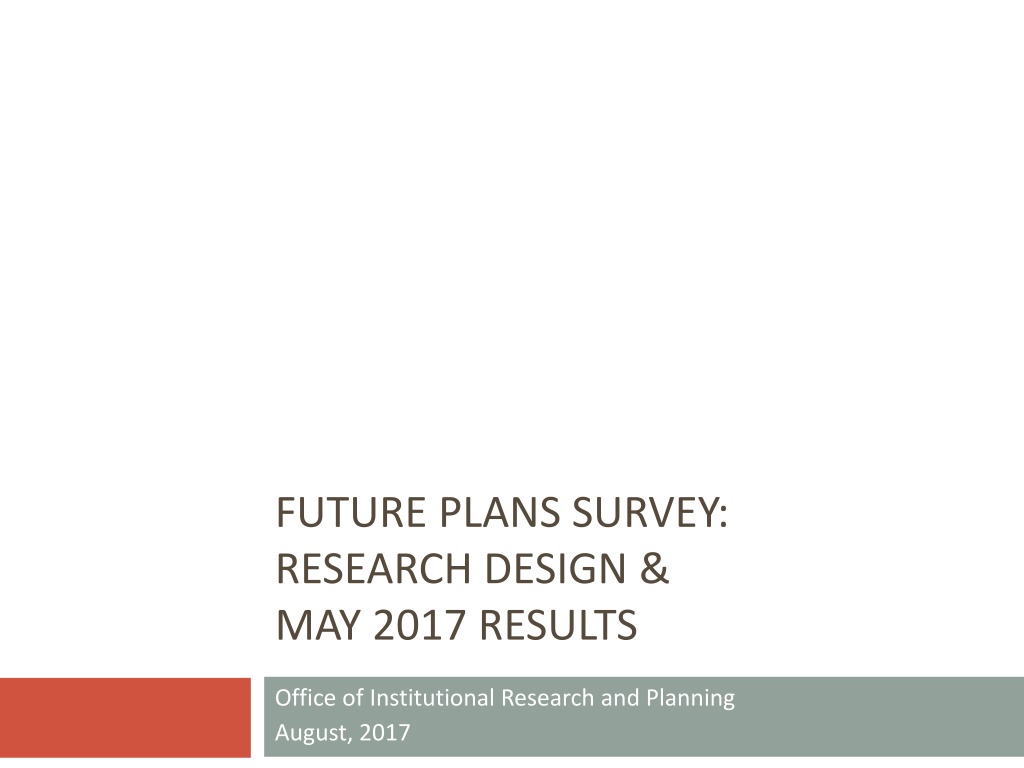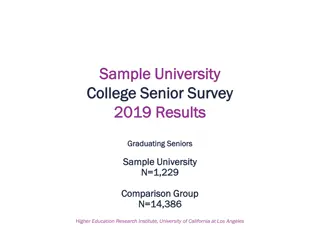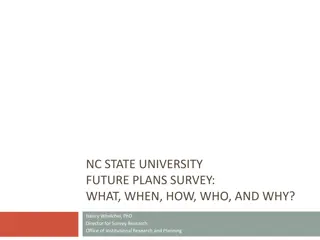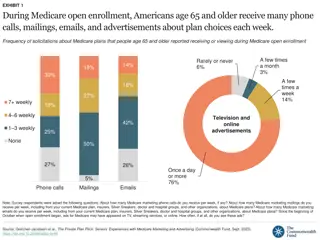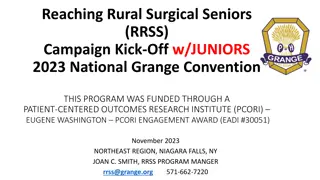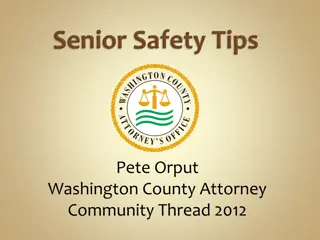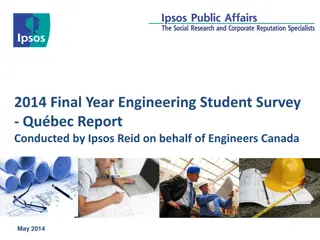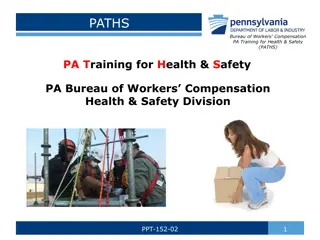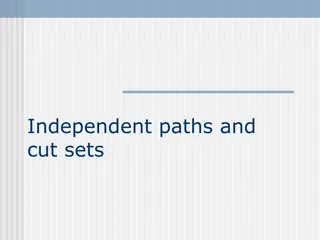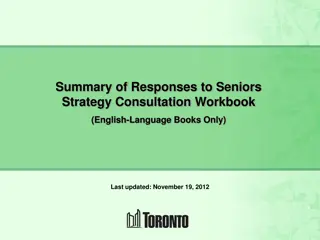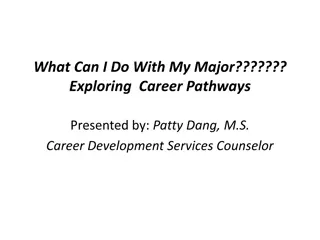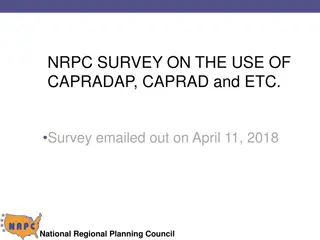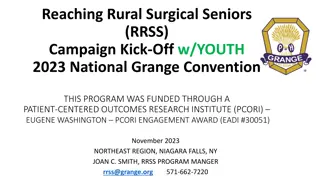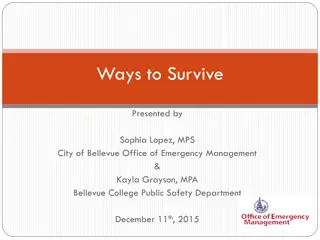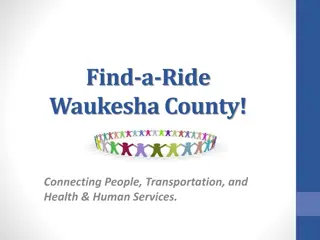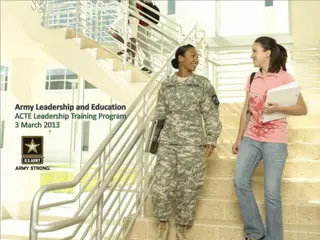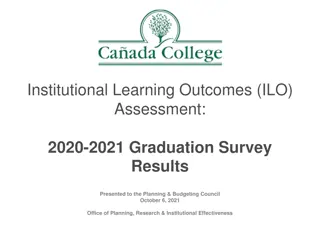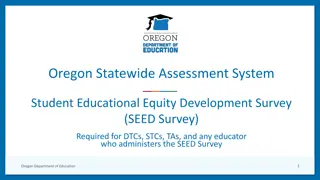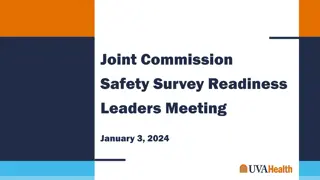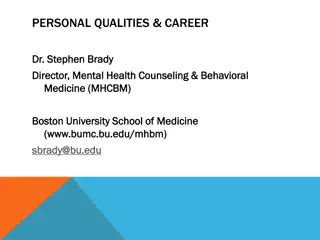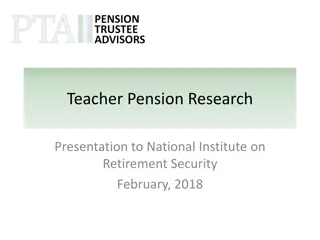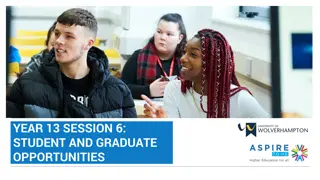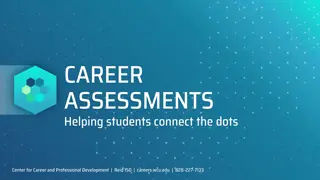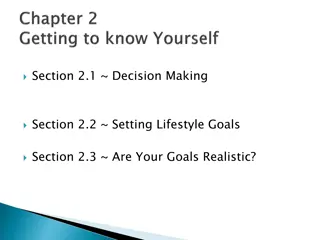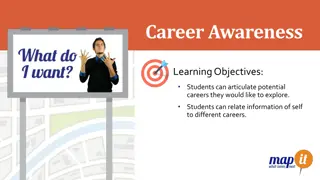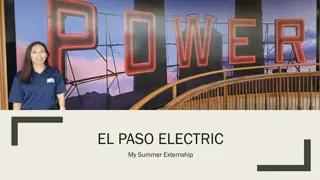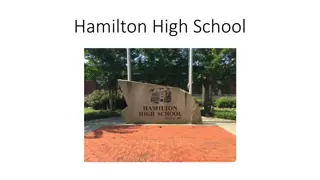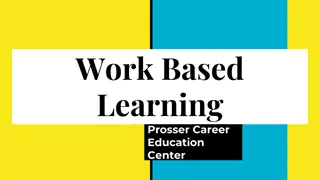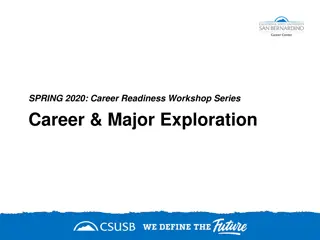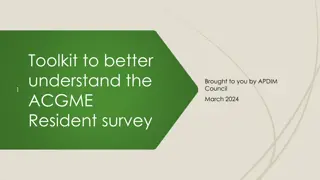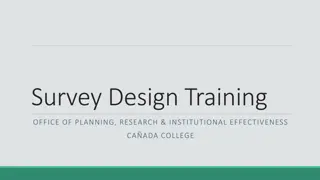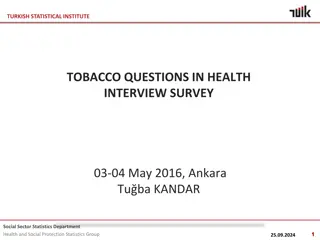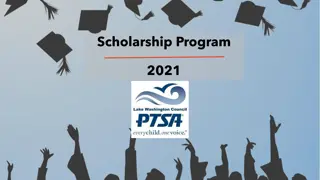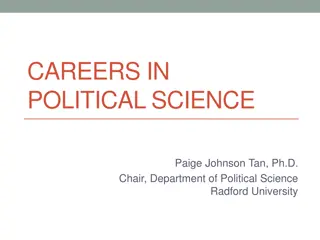Future Plans Survey: Insights on Graduating Seniors' Career Paths
Explore the process and results of the Future Plans Survey conducted by the Office of Institutional Research and Planning in May 2017. This survey aims to gather detailed information from graduating seniors on their future employment, educational pursuits, and experiences at NC State. Discover eligibility criteria, survey administration methods, participation rates, and encouraging strategies for seniors to participate.
Download Presentation

Please find below an Image/Link to download the presentation.
The content on the website is provided AS IS for your information and personal use only. It may not be sold, licensed, or shared on other websites without obtaining consent from the author. Download presentation by click this link. If you encounter any issues during the download, it is possible that the publisher has removed the file from their server.
E N D
Presentation Transcript
FUTURE PLANS SURVEY: RESEARCH DESIGN & MAY 2017 RESULTS Office of Institutional Research and Planning August, 2017
Survey Administration Methods What is the Future Plans Survey and how do we do it?
What is the Future Plans Survey (FPS)? 5 minute survey to collect detailed information from graduating seniors on Future employment Company, location, job title, salary, helpful resources, when began job search Graduate/Professional school Institution, program, degree, awards/scholarships Work-experiences at NC State Participation in and helpfulness of, use of career services and fairs Link to instrument
Who is eligible to participate? All undergraduates who have completed the Application for Degree process to graduate in May are invited to participate Students graduating in the Fall are invited to participate in the December Future Plans Survey
When and how is the survey administered? When The survey goes live on about the first day of final exams (May 2, 2017) The survey stays in the field for about 4 weeks (May 26, 2017) How Online (Qualtrics) Accessible via handheld mobile device Confidential (but not anonymous)
How are senior encouraged to participate? Email invitations and follow-up reminders Incentives Amazon.com gift cards 8 * $25 for early responders 1 * $100 for all responders Departments are encouraged to contact their graduating seniors Electronic Bulletin Boards Flyers Sent to academic departments & posted around campus Announcements at (some) commencement ceremonies
How many graduating seniors actually do the survey? Over the years . . . 100% 90% 80% 70% 61% 60% 60% 59% 57% 57% 56% 56% 53% 53% 52% 51% 51% 50% 49% 47% 40% 30% 20% 10% 0% Dec10 May11 Dec11 May12 Dec12 May13 Dec13 May14 Dec14 May15 Dec15 May16 Dec16 May17
How many graduating seniors did the survey in May 2017? May 2017 Graduating Class Percent of Survey Respondents Percent of Population Survey Respondents Response Rate College/School 373 10.9% 183 9.1% 49.1% College of Agriculture & Life Sciences 94 2.8% 77 3.8% 81.9% College of Design 104 3.0% 72 3.6% 69.2% College of Education 854 25.0% 542 26.9% 63.5% College of Engineering 200 5.9% 108 5.4% 54.0% College of Natural Resources 673 19.7% 378 18.7% 56.2% College of Humanities & Social Sciences 388 11.4% 232 11.5% 59.8% College of Sciences 202 5.9% 129 6.4% 63.9% College of Textiles 524 15.4% 296 14.7% 56.5% Poole College of Management 3,412 100.0% 2,017 100.0% 59.1% Total
How are the results used? Students/parents thinking about majors Employers when making salary offers Students engaged in salary negotiations Employers assessing the new graduate employment pool Career Centers matching job seekers with employers Identifying employers for career fairs Institutional rankings reported by organizations/magazines Assessment activities Career Centers programs and services Academic programs evaluation of career-readiness of graduates Outcomes (job placement, post-graduate enrollment, etc.) NC State Strategic Planning metrics
How do graduating seniors feel about their future? The majority of students feel both confident and prepared for the future Very excited - Confident that this is what I want to do 49% Excited - Fairly sure 36% Somewhat prepared, 44% Very prepared, 50% A bit Somewhat unprepared, 5% Very confused/uncertain - Not really sure 13% Very unprepared, 1% confused/uncertain Don t know 2%
What are seniors plans for after graduation? Employment 49% 60% Have accepted position that will begin after graduation 36% Will continue working in job I had prior to graduation 7% 50% Have started/will be starting my own business Will be working as an intern Military service 1% 3% 1% 49% 40% Volunteer activity 1% 30% Seeking Employment 24% Currently seeking employment 22% 24% 24% 20% Have not begun to seek employment, will begin within year 3% Graduate/Professional School 24% 10% Going to grad/prof school within the year Going to grad/prof school and working 19% 5% 3% 0% Other 3% Employment Seeking Employment Graduate School Other Taking additional undergraduate coursework Starting/raising a family Don't know yet Other 1% <1% 1% 1%
Details About Those Obtaining Full-Time Employment (92% of all those with a job for after graduation) When did they start looking, what was helpful in getting a job, where will they be working, and what will they be earning?
How much does when you start seeking employment make a difference? (By those who found and those who had not found a full-time position) Students who got a full-time job were much more likely than those who did not to start looking for one well in advance of graduation How many months prior to graduation started looking for work Employment Status at Graduation 12 or more months Less than 1 month 9-11 months 6-8 months 3-5 months 1-2 months Found Employment (n=886) 21% 24% 29% 19% 5% 1% Seeking Employment (n=435) 3% 7% 18% 33% 26% 14%
How much does when you start seeking employment make a difference? (By when the senior started seeking employment) 94% of those who started looking for a job at least 12 months before graduation got one, compared to only 16% of those who started looking less than a month before graduation When started looking for work Have Job Still Seeking Job All 12 or more months before graduation (n=199) 94% 6% 15% 9-11 months before graduation (n=239) 88% 12% 18% 6-8 months before graduation (n=336) 77% 23% 25% 3-5 months before graduation (n=315) 55% 45% 24% 1-2 months before graduation (n=159) Less than one month before graduation (n=73) 30% 16% 70% 84% 12% 6%
What resources did seniors say were helpful in securing their job? Internship/externship Career fair at NC State Applied for job via ePACK Campus or college career center Personal connection(s) within the company Family/friends/classmates/co-workers On-campus interviewing Internet: LinkedIn Faculty member or found job listing in an NC State dept Internet (excluding LinkedIn) Employer information session on campus Co-op experience Professional society Consultation with Career Counselor/Coach at NC State Employer found resume via ePACK Student teaching experience Career fair off-campus Staffing agency Other 41% 32% 24% 23% 21% 20% 18% 15% Students obtaining full-time employment found a variety of resources helpful in securing their position. (Remember, these are for all seniors, so, e.g., while not many people overall said a student teaching experience was helpful, this includes lots of students who did not have such an experience, so they would not have said it was helpful .) 9% 9% 9% 8% 6% 6% 5% 4% 2% 2% 8%
How many positions did they interview for? (Differences between those who found and those who had not found a full-time position) More than half of those securing a full-time job had interviewed for three or more different positions While 71% of those without a job had gone on at least one interview, less than one-third had interviewed for three or more positions How many positions interviewed for Employment Status at Graduation None One Two Three Four Five or more Found Employment (n=886) 7% 21% 18% 19% 11% 24% Seeking Employment (n=435) 29% 23% 16% 13% 7% 11%
How many job offers did those accepting a full-time job get? Half of those finding full-time employment had more than one offer from which to choose, with about one-fourth having three or more offers to choose from One other job offer, 28% Only job offer, 49% Two other job offers, 13% Three or more other job offers, 10%
Did those not yet securing employment receive any job offers? One-fourth of those who had gone on an interview for at least one position had received one or more job offers Two-thirds of those who had gone on interviews for three or more positions said they had not received any offers 100% 80% 68% 73% 60% 83% 40% 20% 32% 27% 17% 0% Interviewed for: One position Two positions Three or more positions Received any offers None
Is job satisfaction related to how closely the job matches what seniors were majoring in? Most graduates are getting jobs directly related to their academic major. Those in such jobs are most likely to be very satisfied. 65% 32% 3% Directly related (n=603) 58% 34% 6% 2% Somewhat related (n=257) 3% 51% 26% 21% Not at all related (n=73) 1% 62% 32% 5% All (n=933) 0% 20% 40% 60% 80% 100% Very Satisfied Satisfied Neutral Dissatisfied/Very Dissatisfied
Where will those with a full-time job be working? About 70% of May 2017 grads with full-time employment will be working in NC, with 47% in the Triangle NC: Other 22% NC: Triangle 47% Other 22% SC 3% VA 2% GA 2% FL 2%
How are the full-time employees getting paid? Three-fourths will be paid by salary But just over half will be getting only a salary Salary only Hourly only Salary plus perf. bonuses Salary plus commission Salary plus hourly Salary plus comm plus perf bonus Hourly plus perf. bonuses Commission only Performance bonuses only Hourly plus tips Hourly plus comm plus perf bonus Hourly plus commission Other comp. only Other combinations 58% 17% 11% 3% 2% 2% 1% 1% <1% <1% <1% <1% 2% 3% Salary 76% Hourly 21% Performance Bonuses 16% Commission 6% Tips/Gratuity 1% Other 4% % 20% 40% 60% 80% 100%
And what will they be earning? Over one-third of full-time employed graduates estimate their starting salary to be $60,000 or more, with an average salary of $51,781 25% 22% 20% 18% 15% 17% 13% 12% 10% 11% 5% 2% 1% 4% % Less than $30,000 $30,000 - $39,999 $40,000 - $49,999 $50,000 - $59,999 $60,000 - $69,999 $70,000 - $79,999 $80,000 or more Would prefer not answer Not sure
What about a signing bonus? 23% of all those obtaining full-time employment received a signing bonus; over 30% of students from the College of Engineering and Poole College of Management got a signing bonus 35% 33% 30% 25% 26% 20% 18% 15% 10% 9% 8% 5% 3% 3% 1% % Less than $2,000 $2,000 to $3,999 $4,000 to $5,999 $6,000 to $7,999 $8,000 to $9,999 $10,000 or more Would prefer not answer Not sure
And what about a relocation package? One-fifth of all those obtaining full-time employment were offered a relocation package; over half of those finding work outside NC were offered a relocation package 54% 39% 7% Outside NC (n=272) 23% 50% 27% NC: Outside Triangle (n=191) 0% 10% 20% 30% 40% 50% 60% 70% 80% 90% 100% Yes No Not applicable
Details about Those Continuing their Education Where are they going and what are they going to study?
Who is going to graduate/professional School? About one-fourth of respondents said they are planning on going to graduate or professional school in the coming year 50% 45% 10% 40% 35% 30% Grad/Prof School & Working 6% 25% 9% 5% 20% 3% 36% Grad/Prof School 3% 15% 10% 1% 24% 10% 1% 19% 19% 4% 18% 15% 12% 5% 9% 9% 7% 0% NCSU CALS Design CED COE CNR CHASS COS COT PCOM
Why do they want to continue their formal education? Those going to grad/prof school are most likely to say that their chosen career requires an advanced degree and to enhance my knowledge in a particular subject area Other 7% Employer encouraging me to attend 4% Unable to find a job 4% To improve my marketability 47% To earn a higher salary with an advanced degree 54% Enhance my knowledge in a particular subject 64% Chosen career field requires grad/prof school 65% % 10% 20% 30% 40% 50% 60% 70% 80%
How many seniors have already been accepted to a graduate/professional school? Three-fourths of the May grads planning on going to grad/prof school have been accepted and know where they will be attending Have been accepted and know where I'm going, 78% Have not applied but plan to do so within the next year, 14% Have applied, but not yet been accepted, 6% Have been accepted but undecided, 2%
What institutions will they be attending? (among those accepted and enrolling) Just over 100 different institutions around the nation and the world About two-thirds will be staying in North Carolina Over 40% will be enrolled at NC State
What degrees are they currently seeking? A majority of those going on to grad/prof school will be enrolled in a Master s program. Those seeking a professional degree are most likely to be pursuing a JD. DVM, 21% Professional, 21% MD, 14% Master's, 61% JD, 34% PharmD, 9% Doctoral, 18% DPT, 8% Other (e.g., Barch), 2%
Work-Related Experiences at NC State What did seniors do to prepare for the future?
What did they participate in, and how helpful was the experience? Participated in: How helpful the experience was in getting a job: 100% 63% 28% 10% Internship 80% 20% 48% 32% Class project 60% 65% 46% 36% 18% Research w/ faculty 40% 40% 42% 18% Student teaching 20% 25% 25% 64% 25% 12% Co-op 11% 8% 7% 0% 40% 41% 19% Practicum 0% 20% 40% 60% 80% 100% Very helpful Somewhat helpful Not very/Not at all helpful
Who uses the various career offices? While 44% of the seniors said they went to the NC State Career Development Center, usage varies by college Students in colleges with their own career centers are likely to use them, with a high degree of variation by college 70% 41% CALS -> CALS Career Services 60% 59% 50% Design -> Design Career Services 70% 46%48% 40% 43% 30% 32% 32% 91% COT -> COT Career Services 27% 20% 22% PCOM -> PCOM Career Development Center 10% 64% 5% 0% CALS Design CED COE CNR CHASS COS COT PCOM 0% 20% 40% 60% 80% 100%
Do those who use the career offices think they are any good? Ratings were largely positive, with career services offices most often rated as excellent or good Career Development Center 31% 51% 16% 3% CALS Career Services 47% 38% 13% 2% College of Design Career Services 31% 44% 18% 7% College of Textiles Career Services 77% 20% 3% PCOM Career Development Center 46% 42% 11% 1% 0% 20% 40% 60% 80% 100% Excellent Good Fair Poor/Very Poor
What about other activities to help in the job search? Two-thirds of students utilized ePACK and attended at least one career fair Participation was high for both by those going to work or grad/professional school 100% NCSU (n=1,988) 80% ePACK Attended career fair Presentations on resume writing, interviewing skills, etc Joined professional society at NCSU related to career field Visited NC State Career Development Center website Attended employer info sessions On-campus interviewing Spoke w/ Career Counselor/Coach Mock interviews w/ Career Counselor/Coach 70.8% 67.3% 37.2% 72% 69% 60% 66% 61% 40% 33.0% 32.1% 31.0% 30.3% 22.2% 10.6% 20% 0% ePACK Attended career fair Working Grad/Prof School
Which career fairs did seniors attend? NC State seniors attended a variety of career fairs With large majorities of students attending the career fair for their college Engineering Career Fair Poole COM Career & Internship Fair CALS Career Expo Textiles Job Forum CHASS Career Fair Sciences, Sustainability, & Environmental Career Fair Health Career Expo College of Design Networking Fair Law School Fair Grad School Career Fair at NC State Other fair at NC State Other career fair 44% 23% 9% 9% 7% COE -> Engineering Career Fair PCOM -> PCOM Career & Internship Fair COT -> Textiles Job Forum Design -> College of Design Networking Fair CALS> CALS Career Expo CHASS -> CHASS Career Fair CNR -> Sciences, Sustainability, & Environmental Career Fair COS -> Health Career Expo CED -> Other career fair CHASS -> Law School Fair 99% 98% 99% 98% 74% 54% 6% 5% 4% 2% 2% 11% 5% 51% 37% 59% 10%
Are seniors satisfied with the career guidance they got from their academic department? While majorities of graduating seniors are satisfied with the career guidance they received in their academic department, they are more likely to be satisfied than very satisfied Satisfied, 41% Neutral, 23% Very Satisfied, 29% Very Dissatisfied, 2% Dissatisfied, 5%
There is LOTS more information online! https://oirp.ncsu.edu/surveys/survey-reports/studentalumni- surveys/future-plans-survey-and-survey-of-recent-graduates/ Methods & response rate information Detailed tables of results for all respondents overall, with text summaries Detailed tables of results for most questions by college College summaries Table w/ results by department Response rate N w/ full-time job N going to grad/prof school Salary (25th percentile, median, 75th percentile, average) Tables with employment information Company, location, job title, helpful resources Tables with grad/prof school information Institution, location, degree, program Average salaries & graduate/professional school attendance by college, department, academic program (Point and click interface [http://apps.oirp.ncsu.edu/pgem])
Want still more information, or have a suggestion? Contact Nancy Whelchel, Director for Survey Research Office of Institutional Research and Planning Nancy_whelchel@ncsu.edu Suzanne Crockett, Assistant Director for Survey Research Office of Institutional Research and Planning sacrocke@ncsu.edu
